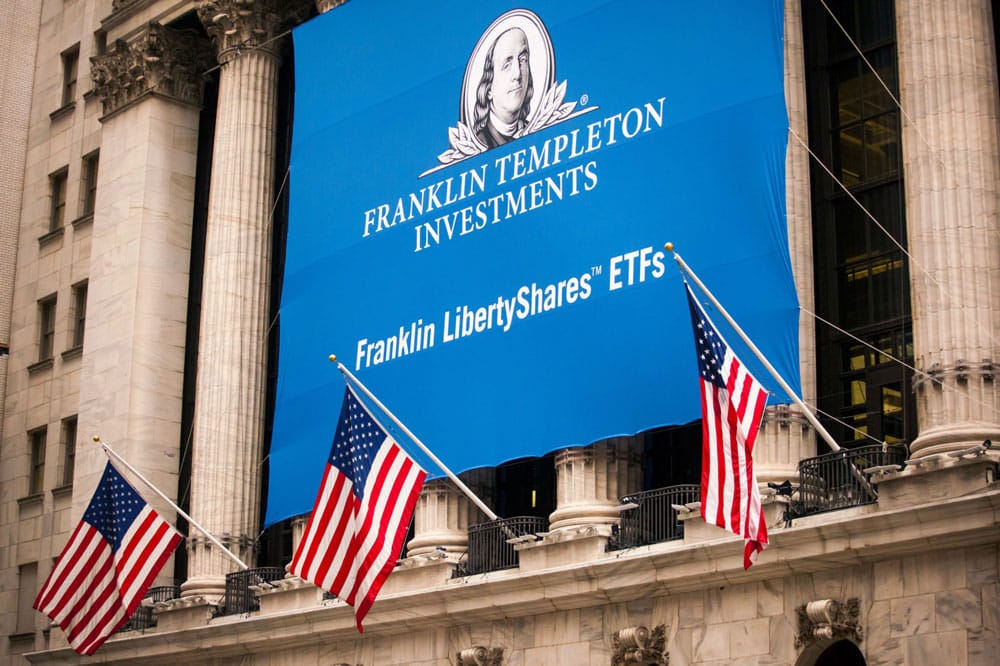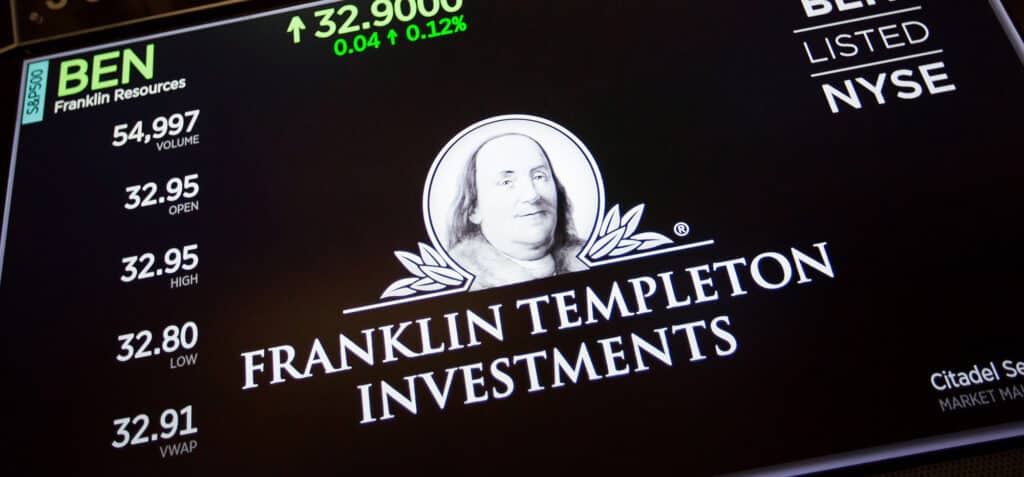Franklin Templeton US Opportunities Fund Review – that will be the topic of today’s article.
Read about the Franklin Templeton US Opportunities Fund and compare it with the Zurich International Vista Savings Plan.
Nothing written here should be considered as financial advice, nor a solicitation to invest.
For any questions, or if you are looking to invest as an expat, you can contact me using this form, or via the WhatsApp function below.
Introduction
For any questions, or if you are looking to invest as an expat, you can contact me using this form, or via the WhatsApp function below.
Franklin Templeton has grown from being recognized as one of the best small businesses in America to a leading global investment management organization. We offer clients a valuable perspective shaped by our seventy years of experience, investment expertise, and growing global reach.
The company was founded in 1947 in New York by Rupert H. Johnson, Sr., who ran a successful retail brokerage firm from a Wall Street office. He named the company after the US founding father, Benjamin Franklin, because Franklin embodied the ideas of thrift and discretion when it came to saving and investing. The company’s first line of mutual funds, Franklin Custodian Funds, was a series of conservatively managed stock and bond funds intended for most investors.
Franklin Resources Inc. – American multinational holding company, which together with its subsidiaries is called Franklin Templeton; is a global investment company founded in New York in 1947 under the name Franklin Distributors, Inc.
It is listed on the New York Stock Exchange under the ticker BEN, after Benjamin Franklin, after whom the company is named and who admired founder Rupert Johnson Sr. In 1973, the company’s headquarters moved from New York to San Mateo, California. As of October 12, 2020, Franklin Templeton held $ 1.4 trillion in assets under management (AUM) on behalf of private, professional, and institutional investors.
Mutual funds and ETFs

Franklin Templeton has over 455 different open-ended mutual funds and 7 closed-end funds in the family of funds. These include 27 state and federal tax-free funds, an investment area pioneered by Franklin.
Prominent funds in the fund family include the Templeton Growth Fund, Inc. (opened 1954, $ 8.8 billion in AUM, Mutual Equity Fund (opened 1949, $ 7.9 billion in assets), And Mutual Discovery Fund. (opened 1992 ., assets worth $ 14.5 billion) and Templeton Growth (euros) Fund A (assets worth $ 6.2 billion).
The Franklin Income Fund (FKINX, $ 61.1 billion in assets) Is a Morningstar mutual fund categorized as “conservative allocation” and “big / security boxes.” for 60 years Franklin’s Income Fund consists primarily of stocks and bonds that pay dividends (2%).
Franklin Templeton launched his first ETF in 2013 and the platform now includes over 55 active, smart beta, and passively managed ETFs in the U.S. The company’s U.S. ETF platform had approximately $ 9.7 billion under management as of November 30, 2021 USA.
Franklin US Opportunities Fund
The fund seeks to achieve capital gains by investing primarily in equity securities of US companies that are considered to have sustainable growth characteristics and meet growth, quality, and valuation criteria. These include small, medium, and large companies with high growth potential in a wide range of sectors, with exceptional growth potential, and fast-growing innovative companies in these sectors.
In case you are looking for an advisor to help you invest in the Franklin US Opportunities Fund, check out this form and send your application to us.
Mutual fund investors own shares in a company that buys shares in other companies (or bonds, or other securities). Mutual fund investors do not directly own shares of the companies acquired by the fund, but they are equally involved in the gains or losses on the fund’s total investments – hence the term “mutual” in mutual funds.
A mutual fund is an investment that pools investors’ money to buy stocks, bonds, and other assets. A mutual fund aims to build a more diversified portfolio than the average investor could on their own. In mutual funds, professional fund managers buy securities for you.
Either way, you should remember that all investments come with a certain amount of risk and you can potentially lose money by investing in a mutual fund. But diversification is often inherent in mutual funds, which means that by investing in one, you are spreading risk across multiple companies or industries. On the other hand, investing in individual stocks or other investments is often associated with increased risk.
Time is a critical element in adding value to your investment. If you need your money in five years or less, you may not have enough time to overcome the inevitable peaks and valleys of the market in order to make a profit. If you need money in two years and the market is falling, you may have to take that money at a loss. Generally speaking, mutual funds – especially mutual funds – should be viewed as a long-term investments.
This fund will be a good investment option for those, who are:
- Striving to increase capital by investing in equity securities.
- Seeking investment in growth in sectors showing above average growth or growth potential relative to the economy as a whole.
- Looking for investments concentrated in shares of American issuers.
- Planning to hold their investments in the medium to long term.
But why you should consider the Franklin US Opportunities Fund?

- Access to the US market. The fund provides access to the US stock market and covers the shares of US companies with a flexible market capitalization strategy; there are no minimum or maximum capitalization rules.
- Growth-style clean foundation. When choosing securities, portfolio managers focus on companies that have shown accelerated growth and strong financial performance.
- Proven investment process. Portfolio composition and industry weights are the result of a bottom-up stock selection process and are formed as part of an established diversification policy. No sectors are excluded from the security selection process.
- All the benefits of a first-class research team. Franklin has one of the largest stock research groups in the United States.
- Dedicated portfolio management team. Lead Portfolio Manager specializes in equity analysis in IT services, computing hardware and storage. In addition, the investment team is based in San Mateo, in the heart of Silicon Valley.
What risks an investor can face?
The value of the shares in the Fund and the income received from it can both fall and grow, and investors may not return the invested amount in full. Performance can also be affected by currency fluctuations. Fluctuations in exchange rates can affect the value of foreign investments.
- The fund invests primarily in equity securities of companies located in the United States or doing significant business in the United States. These securities have historically been subject to significant price fluctuations that can occur suddenly due to market or company-specific factors. As a result, the performance of the Fund can fluctuate significantly over time.
- Equity risk: the risk that the default or insolvency of a borrower on securities lent by the Fund may result in losses if the collateral received is sold for less than the value of the loaned securities.
How to invest in mutual funds?

Here are some tips on how to invest in mutual funds:
1. Decide if it should be active or passive
Your first choice is perhaps the most important: do you want to outperform the market or try to imitate it? It’s also a fairly straightforward choice: one approach is more expensive than the other, often without better results.
Actively managed funds are run by professionals who research the market and shop to get around the market. Even if several fund managers can reach this point in a short timeframe, it can be still challenging to outperform the market in the long timeframe and on a regular basis.
Passive investing is a safer approach and its popularity is growing in large part because of the simplicity of the process and the results it provides. Passive investing often entails lower fees than active investing.
2. Calculate your budget
Think about your budget in two ways to determine how to proceed:
How much do mutual funds cost? Mutual funds have one attractive feature: once you reach the minimum investment amount, you can often choose how much money you want to invest.
Many minimum mutual fund amounts can range from $ 500 to $ 2,000. But if you choose a fund with a minimum of $ 500 and invest that amount, you can deposit as much or less as you like. In addition to the required initial investment, ask yourself how much money is comfortable for you to invest, and then choose the amount.
3. Decide Where to Buy Mutual Funds
First you will need a brokerage account to start investing in stocks, but with mutual funds you can have other options too. If you are depositing funds into an employer-sponsored retirement account, such as 401 (k), there is a good chance that you have already invested in mutual funds.
Most investors choose to buy mutual funds through online brokerage companies, many of which offer a wide variety of funds from various fund companies. If you go with a broker, you should consider:
- Availability. Mutual fund investors can face two types of fees: from their brokerage account (transaction fees) and from the funds themselves (expense ratios and upstream and downstream “sales load”). More on this below.
- Fund selection. Workplace retirement plans can only include a dozen or so mutual funds. You may want more variety. Some brokers offer hundreds or even thousands of funds to choose from with no transaction fees, as well as other types of funds such as ETFs.
- Research and educational tools. With more choice comes the need for more thought and research. It is imperative that you choose a broker who can help you learn more about the fund before investing your money.
- Ease of use. A brokerage website or app won’t be helpful if you can’t figure it out. You want to understand and feel comfortable with this experience.
4. Learn about the fees of mutual funds.
Whether you choose active or passive funds, the company will charge you an annual fund management fee and other fund management costs expressed as a percentage of the money you put in, known as the expense ratio.
Fund cost ratios are not always easy to determine in advance, but it is worth the effort to understand because these fees can eat up your bottom line over time.
Pained by financial indecision? Want to invest with Adam?
Adam is an internationally recognised author on financial matters, with over 352.4 million answers views on Quora.com and a widely sold book on Amazon



